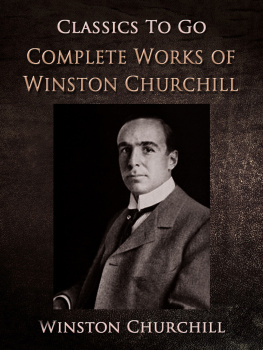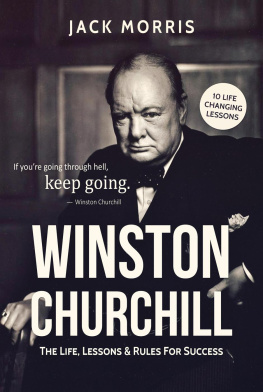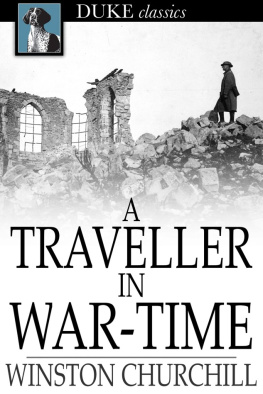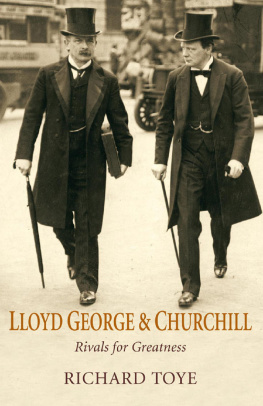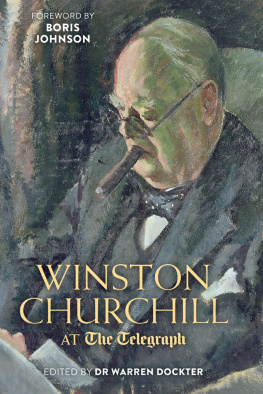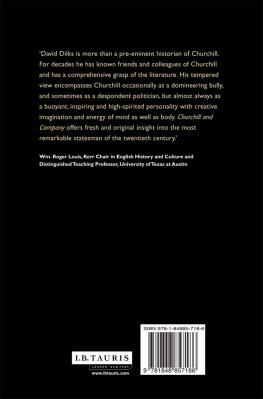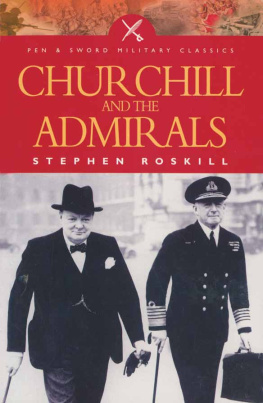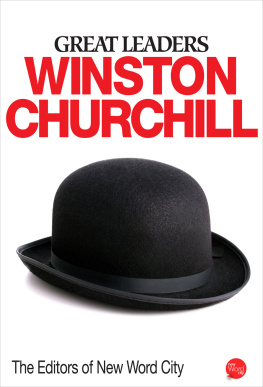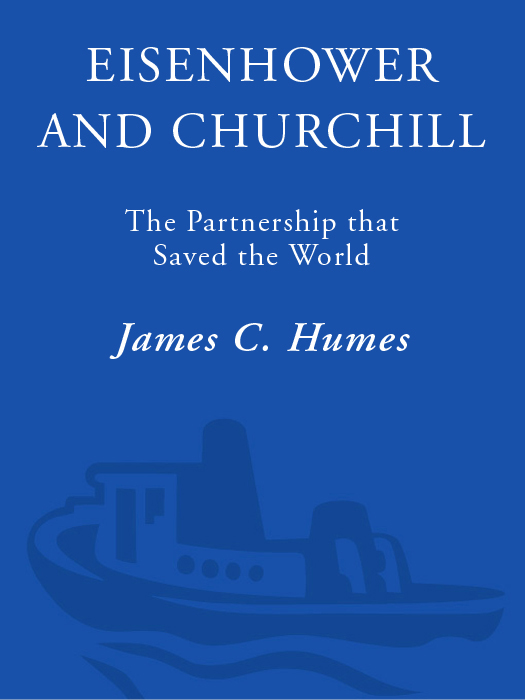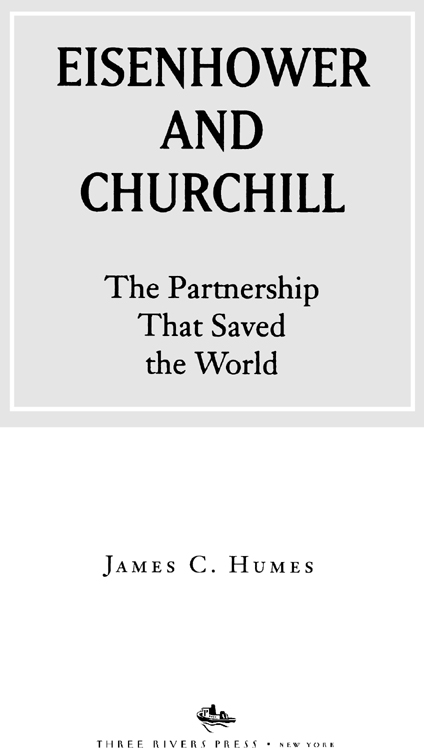FOREWORD
IN THE TWENTIETH CENTURY , no two men did more than Winston Churchill and Dwight Eisenhower to combat the twin evils of tyranny: fascism and communism. And for the most significant passages of their historic public careers, they worked in partnership, representing different nations and in distinctly different capacities and roles.
In the Second World War, if Churchill was the voice of freedom, Eisenhower provided the implementing hands.
With the vision of an Old Testament prophet, Churchill will forever be known as the first Western statesman to decry the rise of Nazism, and his stirring rhetoric would rally England and the Free World at the precipice of defeat. And after the ultimate victory over Germany, Churchill, in his Iron Curtain speech, became the first Western statesman to warn against the Stalinist threat to Europe. Genius and moral leadership are terms that describe Sir Winston, arguably, the leading man of the century.
Eisenhowers gifts lay not so much in his voice or in an articulated vision but in organizational brilliance and perceptiveness about people. Military strategist and diplomat are terms that describe him. As commander of the combined Allied force in northwest Europe, Eisenhower staged the greatest amphibious landings in military history. As a military diplomat, he forged the most celebrated integrated command in history. And as a naturally gifted politician, Eisenhower would go on to become president of the United States at the height of the cold war struggle for which Churchill had mobilized the sentiments of the Free World.
The relationship between two such different men would be interesting in any context, but it is of special historical interest for several reasons. First, the cause they served together succeeded. Second, that success was completely dependent on cooperative efforts by an international coalition, hence the importance of their working relationship, one that succeeded though the relationship defied easy definitions of protocol and was rarely one of equals. During the war, Eisenhower, as an Allied military commander, was ostensibly subordinate to the British prime minister, though technically he was accountable only to a combined U.S.-British authority over which British influence steadily waned. As the war progressed, as differences of opinion arose, differences stemming from the contrasting outlooks of a military-minded officer and a politically oriented prime minister, the subordinate Eisenhower tended to prevail more and more against his superior Churchill. But invariably, the clash of views led to consensus and unprecedented Allied effectiveness.
The unevenness in rank continued in 1951, when their earlier collaboration resumed with Churchills return as prime minister and Trumans designation of Eisenhower to lead the fledgling NATO command. Again, if Churchills warnings served to galvanize the Free World to action, it was Eisenhower who organized the military and organizational might that consolidated the Atlantic alliance that would prevail in time over the Soviets. When Eisenhower was elected president in 1952, the relationship changed again. Eisenhower became Head of Stateequivalent to the Kingwhile Churchill remained Head of Government. More important, an economically bankrupt Britain that was losing its empire was no longer the equal of the United States. Incontestably, the Americans had assumed leadership.
The familiar differences in outlook remained, and despite Eisenhowers formal seniority, the pattern of their personal relationship seems unaffected. The aging statesman, who had invented the word summit conference, unsuccessfully pressed Eisenhower at the outset of his presidency to engage the Soviets in discussions, only to get his way eventually. Arguably, it was in the years 19531955, Churchills last as prime minister, Eisenhowers first as president, that the alliance they both cherished became a bipartisan commitment and a geopolitical fact.
In assessing the successful collaboration between these two men, historians may be prone to emphasize impersonal forces that compelled cooperation among the allies. But it would be a mistake to ignore the personal factor. Put simply, Churchill and Eisenhower worked well together because they got along. They did so because Churchill appreciated and esteemed Eisenhowers professional and personal qualities, and Eisenhower knew it. And for his part, Eisenhower revered Churchill as a personal hero, which Churchill doubtlessly knew, enhancing Churchills esteem for Eisenhower.
Indeed, through the years, the warmth of friendship ever increased by each talk on the phone, by every exchange by letter, or during their personal meetings in Washington, one of which I observed as a child.
The day was Monday, May 4, 1959. As grandchildren of the President, my three sisters and I were permitted to leave school early in nearby Alexandria to greet Sir Winston Churchill, now retired, who had arrived in Washington for several days as Granddads guest in the White House. Often in those days, the grandchildren had been included in socials for prominent foreign visitors. But this one was special, and it will always stand out in my mind, not so much because of Churchills fame and renownwe had met Queen Elizabeth, Nehru, MacMillan, and Krushchev, to name a fewbut because of Granddads demeanor and conduct. Diminished by age and strokes, Sir Winston had difficulty getting around and he occasionally lapsed into silences when we gathered in the west hall of the White House. But Granddad was completely thrilled to have him anyway. Usually formal with visitors, Granddad completely doted on Sir Winston, physically guiding him around the room, tending to his wants, filling the silences with cheerful stories and reports lest Sir Winston be taxed. At dinner, he startled my mother with an aside: If only you could have spent five minutes with him in his prime, Granddad whispered.
Their backgrounds could not have been more differentthe grandson of an English duke and a small town Kansas boy who grew up on the wrong side of the tracks. And as James Humes emphasizes in this book, they shared many common interests and passions and, in several key ways, had parallel experiences. Perhaps the most important similarity was that both were graduates of military academies. During the Great War and afterwards, both championed the tank and embraced the new doctrines of mobile warfare. Interestingly, both were to be the first heads of government in their respective country to be licensed pilots. In the twenties, they each suffered the loss of a child in the same year. In the thirties, in the prime of life, Churchill and Eisenhower simultaneously endured analogous frustrationof political exile in Churchills case, of obscurity in Eisenhowers. Both men had powerful premonitions of the coming catastrophe in Europe and of the challenges ahead; having quit the cabinet, Churchill spent most of the decade at his Chartwell estate running a virtual shadow government; by early 1938, in the faraway Philippines, restless under the imperious General MacArthur and transfixed by developments a world away in Europe, Eisenhower began priming himself for eventual command duty in the inevitable European war.








